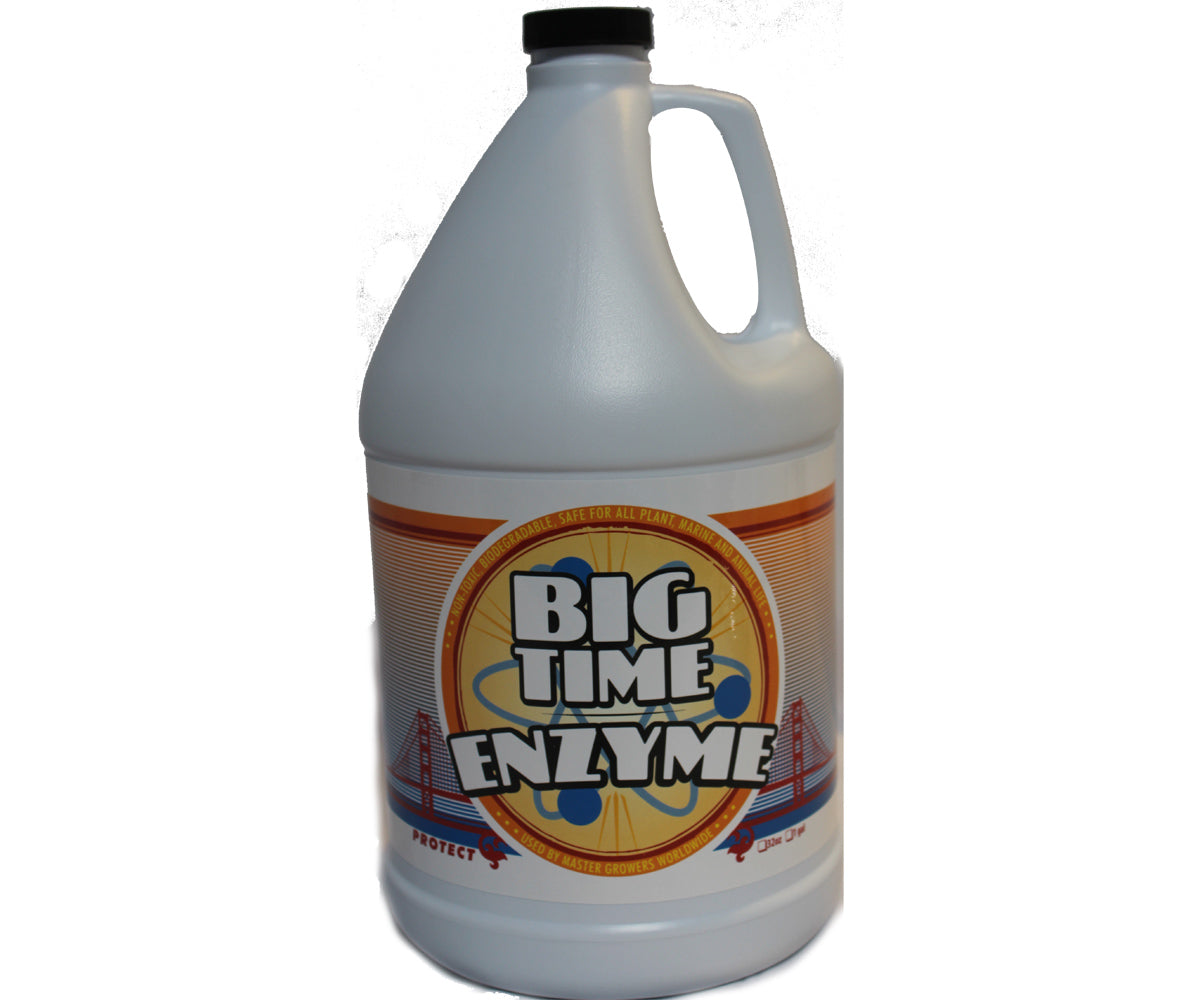Big Time
Big Time Enzyme, 1 gal
Big Time Enzyme, 1 gal
18 in stock
Couldn't load pickup availability
Payment options
- Fast Delivery
- Easy Returns
- Secure Checkout
Description
Description
Big Time Enzyme is a plant growth supplement designed to promote healthier, more robust plants by improving nutrient uptake and nutrient cycling within the plant. This powerful enzyme formula contains a blend of essential enzymes that help break down organic matter in the root zone, making nutrients more accessible to your plants. It's an invaluable addition to any grower's toolkit, whether you're cultivating in soil, hydroponic, or soilless systems.
Key Features:
Enzyme Power: Big Time Enzyme contains a concentrated blend of natural enzymes that assist in the breakdown of organic compounds in the root zone.
Nutrient Uptake: By breaking down complex organic matter into simpler forms, these enzymes make essential nutrients more available to your plants, resulting in better nutrient absorption and utilization.
Healthy Roots: Promotes the development of a vigorous root system by creating a healthier rhizosphere, the area surrounding the roots where nutrient absorption takes place.
Stress Reduction: Enzymes in Big Time Enzyme help reduce stress on plants by improving their ability to extract nutrients from the growing medium.
Versatile Application: Suitable for use in soil, coco coir, and hydroponic systems, offering versatility to growers.
Increased Yields: Improved nutrient availability and root health often translate to more substantial yields and healthier, thriving plants.
Benefits of Using Big Time Enzyme:
Enhanced Nutrient Efficiency: Improved nutrient availability means your plants can access the vital elements they need for growth more efficiently.
Healthy Roots: A robust root system is crucial for nutrient uptake and overall plant health. Big Time Enzyme supports root vitality.
Reduced Plant Stress: When nutrients are more accessible, plants are less stressed and better able to withstand environmental challenges.
Optimal Growth: With easier access to essential elements, your plants are better equipped for vigorous growth, leading to larger and healthier crops.
Compatibility: Works well with a wide range of nutrient programs and is suitable for various growing mediums.
Applications:
Regular Feeding: Add Big Time Enzyme to your nutrient solution at the recommended dosage throughout your plant's growth cycle.
Hydroponic and Soilless Systems: Compatible with hydroponic systems, including DWC (Deep Water Culture), aeroponics, and NFT (Nutrient Film Technique).
Soil and Coco Coir: Can be used in soil and coco coir-based growing mediums for improved nutrient cycling.
Foliar Application: Some growers also use it as a foliar spray for quicker nutrient absorption through the leaves.
Seedlings and Clones: Diluted solutions can be used to soak seeds or facilitate rooting in clones.
Big Time Enzyme is an indispensable tool for growers looking to maximize their plants' nutrient uptake and overall health. By promoting healthier roots and more efficient nutrient utilization, it contributes to the production of larger, more bountiful crops while reducing stress on your plants. Whether you're growing in soil, hydroponics, or coco coir, this enzyme supplement can help unlock your plant's full potential.
Share

INFORMATION QUESTIONS
FREQUENTLY ASKED QUESTIONS
What is Hydroponics?
Hydroponics is the science of growing plants without soil. The plants thrive on the nutrient-water solution alone. The growing medium merely acts as a support for the plants and their root systems while the solution passes freely. The growing medium, if any, is totally inert.
What types of plants grow best hydroponically?
Anything can be grown hydroponically, but some plants prove to be more space efficient. Some plants we suggest are tomatoes, sweet peppers, hot chilies, lettuce, spinach, squash, cucumbers, broccoli, beans, snow peas, herbs and flowers of all types.
Can you REALLY get better yields/quicker growth?
Absolutely. The plants, when receiving everything they need, tend to be healthier, faster growing and generally more productive. You can expect 30% faster growth with many crops.
What are the watering cycle timelines hydroponic systems?
Once the reservoir is filled with nutrients, it is time to put your hydro system to work! The ease of hydroponics is automation – automation is achieved by putting the pump on a timer according to your watering needs. The watering cycle depends on growth stage, growing medium and hydroponic system. In an ebb and flow or drip system with rockwool as the medium, seedlings, clones and plants in the early vegetative stage require watering only once a day for 15-30 minutes (twice a day for higher temps). Mature, flowering and fruiting plants require a heavier feed and can be fed once a day for 30 minutes (twice a day for higher temps). Typically soiless mixes and coco fiber can be watered for about 15 minutes twice a day, and can be adjusted for heavier feeding during the flowering and fruiting stage or higher temps. ViaStone, Hydroton, Grow Rocks, and Silicate mediums need to be watered more frequently – a constant drip for drip systems, and about 15-30 minutes every 3 hours for ebb and flow systems and can be adjusted for heavier feeding during the flowering and fruiting stage or higher temps. Aeroponic systems require frequent watering cycles; 30-60 seconds every few minutes or a constant spray.
What do I need to test pH? How do I test pH?
pH has a range from 0 (acidic) – 14 (alkaline), with 7 being neutral. A proper hydroponic pH range is between 5.5 to 6.2 for most hydroponic crops. For specific crop pH, check out our Plant Guide. pH must remain within the proper range for good plant health, disease resistance, and proper nutrient uptake. pH is maintained by adding pH Up and pH Down to the nutrient solution. For more information, see the Testssection of our site.
How will the flavor compare to my outdoor grown, organic produce?
The taste may be even better! This is simply due to the fact that the hydroponically grown plants are getting everything they need, when they need it. Don’t be fooled by “hot house” produce grown commercially. The grower’s primary concern is shipability and storage, not flavor. When you grow your own vegetables at home, you can expect nothing less than excellent results. Plus, hydroponically grown produce has the added benefit of a longer shelf life.

